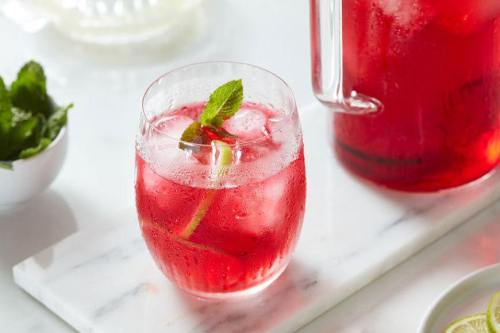7 reasons why hibiscus tea is more than just an Instagram-worthy wellness beverage
See a roundup of hibiscus tea benefits, including how it helps with healthy weight loss and supports the cardiovascular system.

With its ruby red hue and sweet taste, hibiscus tea exudes tropical vacation vibes. Even if you’re still wearing your favorite leggings and teddy bear coat, savoring a glassful will remind your tastebuds—and soul—that warmer weather will return eventually. While it’s just begging to be Instagrammed, hibiscus tea benefits your heal as well.
Rounded up here are seven big ones, each more impressive that the last, to work into your tea rotation. Whether you like your tea hot or iced, either way you’ll be giving your body a boost.
Hibiscus tea benefits you need to know about:
1. It’s rich in polyphenols.
“Hibiscus tea gets its amazing coloring from a polyphenol called anthocyanins,” says registered dietitian Lindsey Joe, RD. She explains that polyphenols are linked to a whole slew of health benefits, including supporting the cardiovascular system, protecting against free radicals, and helping lower inflammation. While she says the polyphenols in hibiscus is correlated with these benefits, more research needs to be done on the best way to get them. “To date, there has been some research done on hibiscus, but the mode of delivery—tea versus extract versus pill—and population size studied varied,” she says. “More research is need to better understand if hibiscus tea has more medicinal properties to note.”
2. It could help lower blood pressure.
The aforementioned polyphenols in hibiscus tea have particularly been linked to lowering blood pressure. “Our data support the view that polyphenols from hibiscus sabdariffa play a regulatory role in metabolic health and in the maintenance of blood pressure, thus implying a multi-faceted impact in metabolic and cardiovascular diseases,” one study reads.
3. Hibiscus tea could help promote healthy weight loss.
Some preliminary evidence suggests that regularly consuming hibiscus tea can help maintain a healthy metabolism and contribute to healthy weight loss. Major caveat: the study was performed on overweight hamsters, not humans, so more research needs to be done. Still, it did show success, including helping to reduce fat affecting the liver.
4. It can contribute to helping protect against cancer.
Like other anti-inflammatory herbs, hibiscus has been found to have anticancer qualities, when consumed regularly. Researchers again credit the high polyphenol content for making it beneficial in this way.
5. It could keep you from getting sick.
Hibiscus is antiviral, which means if some nasty flu germs make their way to you, hibiscus can help fight them off. One study found that hibiscus tea had a stronger antiviral effect than green tea, black tea, rosehip, or rose tea.
6. Hibiscus tea is high in antioxidants.
Besides polyphenols, hibiscus tea is also a good source of antioxidants, which helps to protect against free radicals.
7. It could help lower cholesterol.
Scientific research suggests that consuming hibiscus tea can help lower serum lipids—aka fat—in the body, which in turn can help lower cholesterol. Yet another reason why it’s so good for your cardiovascular system.
Hibiscus is naturally sweet on its own, but many brands still put added sugar into the bottled stuff. Be sure to check the nutrition label and ingredients list so you know you’re getting as pure of a product as you possibly can and maximum nutritional benefits.
“Teas made with hibiscus only are caffeine-free so could make for a fun, flavorful alternative when you need to cut yourself off from coffee for the day,” Joe says.
Keep those tropical vibes coming!
If you’re enjoying your hibiscus tea after hours, try this cocktail recipe. And another tea worth your attention: classic earl grey.
Sign Up for Our Daily Newsletter
Get all the latest in wellness, trends, food, fitness, beauty, and more delivered right to your inbox.
Got it, you've been added to our email list.










